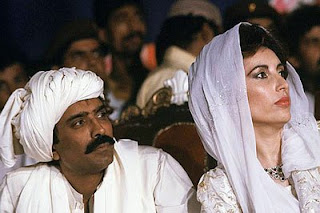PakAlumni Worldwide: The Global Social Network
The Global Social Network
Expect More Economic Woes Under President Zardari

As Pakistan finds itself in the midst of arguably the worst economic crisis in its sixty one year history, the recent accounts of Mr. Zardari's understanding of the economy are not particularly encouraging. It is certainly a huge letdown after Prime Minister Shaukat Aziz, whose expertise on economic matters is well known. Here are the relevant excerpts from a report in the New York Times:

Two recent decisions by Mr. Zardari showed a disregard for Pakistan’s alarming deficits, they (sources) said, speaking anonymously because they did not want to publicly criticize the next president.
In April, Mr. Zardari told Ishaq Dar, the finance minister at the time and a member of Mr. Sharif’s party, which has since broken with Mr. Zardari, that he wanted the price the government paid farmers for wheat to be raised substantially as a way of rewarding an important constituency in Punjab Province, the nation’s most populous, according to two participants in the discussion with Mr. Zardari. The government would then have to heavily subsidize the cost of wheat to the consumer.
When Mr. Dar asked Mr. Zardari how he thought the government would pay for the subsidy, Mr. Zardari replied, “Print the notes,” according to the two participants, a government official and an associate of Mr. Zardari’s. In an effort to solve the impasse over the subsidy, it was suggested that Mr. Zardari form a committee of experts.
“ ‘I am the expert,’ ” Mr. Zardari said, according to his associate.
Farahnaz Ispahani, a spokeswoman for Mr. Zardari’s party, denied the account.
The two officials described another episode in May as the budget was being prepared. Mr. Zardari decided to scrap a proposed capital gains tax after a visit from a group of influential stockbrokers from the Karachi stock exchange, they said. The revenue from the capital gains tax, and from an income tax proposal on the rich, would have paid for an income support program for the poorest Pakistanis, they said. More than half of Pakistanis live on less than $2 a day, according to the World Bank.
In Mr. Zardari’s defense, the finance minister, Naveed Qamar, said that political stability would be restored to Pakistan once Mr. Zardari was president, and that the unsettled economy would benefit from the new political order.
Others were not so sure.
“Zardari will wield unprecedented power for a civilian president,” said Maleeha Lodhi, who was appointed as Pakistan’s ambassador to the United States by Ms. Bhutto and then by Gen. Pervez Musharraf when he was Pakistan’s leader. “But he may lack authority in view of his checkered and controversial past.”
Indeed, Mr. Zardari, who is expected to be chosen in Saturday’s election by the Parliament and four provisional assemblies, is the unintended beneficiary of sweeping powers accumulated by President Musharraf, including the right to dismiss the army chief of staff and dissolve Parliament.
Given Mr. Zardari's past record of economic mismanagement as privatization minister in his wife's cabinet, the hopes in his stewardship of Pakitan's economy have not been great. While some measure of political stability will return to Pakistan with President Zardari in office, these latest disclosures are not going to help restore consumer, business and investor confidence in Pakistan, an essential requirement for its economy to start growing again.
-
Comment by khalid Hassan on September 6, 2008 at 11:45am
-
What else can be expected if wolf is guarding the sheep’s, incidents like Baluchistan & incompetent governance is the most probable outcome (of the most corrupt & crippled democratic system we have) is the answer. But again who to blame, according to Pakistan Election Commission, the voter’s turnout of the most recent elections was 44.9 percent, which means almost 88 million people didn’t bother to cast their votes. It’s a very disturbing sign, it shows either the majority of the people don’t care at all or they have lost their faith in the system. But the thing that bothers me most is those 44.9 % fraction who did vote. I mean it’s a human nature that we learn from experience, our personal & some times (the smart ones) learn from others, in our case though, we tried these so called political (non-democratic) parties twice, results were far from reasonable & still they got elected again. I am at loss of words here, I mean do our people have memory of goldfish or they are all mentally challenged. What else can be expected from Mr. 10% , I wont expect no less then 100%.
Comment
Twitter Feed
Live Traffic Feed
Sponsored Links
South Asia Investor Review
Investor Information Blog
Haq's Musings
Riaz Haq's Current Affairs Blog
Please Bookmark This Page!
Blog Posts
India-Israel Axis Threatens Peace in South Asia
The bonhomie between Israeli Prime Minister Netanyahu, an indicted war criminal, and Indian Prime Minister Narendra Modi, accused of killing thousands of Muslims, was on full display this week in Israel. Both leaders committed to supporting the Afghan Taliban regime which is accused of facilitating cross-border terrorist attacks by the TTP in Pakistan. Mr. Modi was warmly welcomed by…
ContinuePosted by Riaz Haq on February 27, 2026 at 10:45am — 2 Comments
Modi's AI Spectacle: Chaos and Deception in New Delhi
The India AI Impact Summit 2026, held at Bharat Mandapam in New Delhi, has been marred by chaos, confusion and deception. The events on the ground have produced unintended media headlines for India's Prime Minister Narendra Modi who wants to be seen as the "vishwaguru" (teacher of the world) in the field of artificial intelligence as well. First, there was massive chaos on the opening day, with long…
ContinuePosted by Riaz Haq on February 19, 2026 at 12:00pm — 13 Comments
© 2026 Created by Riaz Haq.
Powered by
![]()
You need to be a member of PakAlumni Worldwide: The Global Social Network to add comments!
Join PakAlumni Worldwide: The Global Social Network